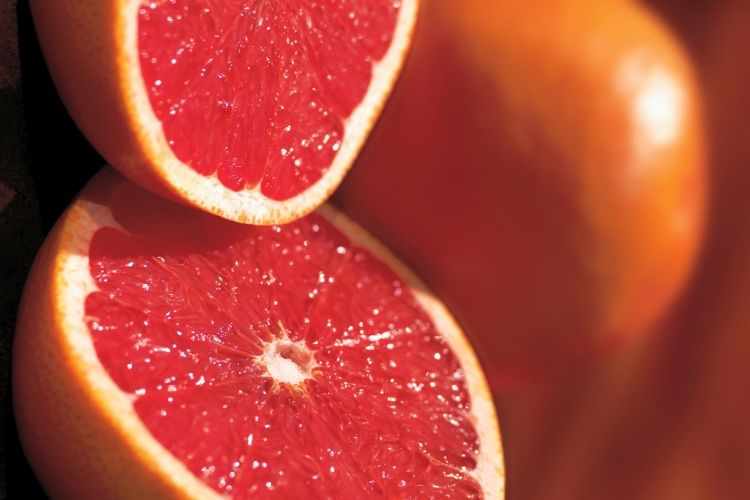Can You Drink Grapefruit Juice on Keto Diet

Not only is grapefruit delicious and versatile, but it is also one of the healthiest foods you can eat. A true superfruit, it's loaded with essential vitamins, minerals and antioxidants.
Whether you enjoy half a grapefruit as a snack or add the fruit's segments to salads, yogurt parfaits or beverages, grapefruit is an excellent addition to any meal plan.
You can even squirt a wedge of grapefruit over your fish and seafood for a change from lemon. The sweet, yet sour taste adds interest to your meals and brings the flavor profile up a notch.
Did you know that this tropical citrus fruit can actually help you shed unwanted pounds? Research shows that grapefruit contains special properties that can help you to lose weight. Later in this article, I'll tell you how incorporating grapefruit into your diet can assist you on your weight loss journey.
Grapefruit Keto Friendly?
A half of a grapefruit contains a moderate amount of carbs (11 grams) and can reasonably be a part of a low carb diet, like Keto.
If you're a strict Keto dieter, you may be worried about consuming this many carbs in just a half of a piece of fruit. However, studies show grapefruit helps with weight loss, reduces appetite and burns belly fat.
Keto dieters may wish to enjoy a small amount of grapefruit along with a serving of protein and healthy fat by incorporating a few grapefruit segments into your salads or pair the fruit with yogurt or cheese.
How Many Carbs are in Grapefruit?
A half of a grapefruit contains 11 grams of net carbs.
A full grapefruit contains 22 grams of net carbs.
How Many Calories are in Grapefruit?
A half of a grapefruit contains 52 calories.
A full grapefruit contains 104 calories.
Nutrition Facts
| Amount: 100 grams of Pink Grapefruit | |
| Calories 42 | |
| Total Fat 0.1 grams | 0% |
| Saturated fat 0 grams | 0% |
| Polyunsaturated fat 0 grams | |
| Monounsaturated fat 0 grams | |
| Cholesterol 0 milligrams | 0% |
| Sodium 0 milligrams | 0% |
| Potassium 135 milligrams | 3% |
| Total Carbohydrate 11 grams | 3% |
| Dietary fiber 1.6 grams | 6% |
| Sugar 7 grams | |
| Protein 0.8 grams | 1% |
| Vitamin A | 23% | Vitamin C | 52% |
| Calcium | 2% | Iron | 0% |
| Vitamin D | 0% | Vitamin B-6 | 5% |
| Cobalamin | 0% | Magnesium | 2% |
Health Benefits

Overview
Grapefruit is an incredibly nutritious fruit – in fact, some claim it is even a superfood. That's because it's high in vitamins, minerals and antioxidant. It's also a good source of fiber. As one of the lowest-calorie fruits, grapefruit contains a decent amount of fiber and a high water content to keep you hydrated.
Immunity Boosting Antioxidants
Grapefruit provides B vitamins, zinc, copper and iron to help promote healthy function of the immune system.
Grapefruit also contains a variety of powerful antioxidants, including the following:
Vitamin C: A potent antioxidant that protects your body's cells from free radical damage that can lead to cancer.
Beta-carotene: An essential nutrient that the body converts into vitamin A. This antioxidant protects against eye disorders, heart disease and cancer.
Lycopene: Another powerful antioxidant that helps in the prevention of certain cancers. This nutrient has been shown to slow the growth of tumors and improve the common side effects of chemotherapy.
Flavanones: A type of flavonoids with anti-inflammatory properties that protect against heart disease while helping to lower blood pressure and cholesterol levels.
Healthy Skin
The high doses of vitamin C in grapefruits are linked to healthy skin. The fruit's skin-protective antioxidants and high water content help keep your skin hydrated and more resistant to free radicals and environmental damage from UV rays and pollutants.
Supports Heart Health
The antioxidants in grapefruit have been shown to help in the regulation of blood pressure and cholesterol levels. Eating the fruit regularly can improve the hearth because of the high levels of potassium.
Potassium is associated with a reduced risk of high blood pressure and can lower the risk of death from heart disease. Additionally, the fiber in the fruit is also linked to lower blood pressure and cholesterol levels.
Helps Prevent Kidney Stones
The citric acid contained in grapefruit has been shown to reduce the build-up of minerals that can lead to kidney stones by binding with calcium and flushing it out of the body.
Side Effects

Grapefruit and grapefruit juice may lead to interactions with a variety of medications. If you eat grapefruit while taking certain medications, your body may not be able to break down the drugs, which could cause an overdose and other serious effects.
If you are taking any medications, consult with your physician before consuming grapefruit as part of your diet.
Eating grapefruit often may lead also lead to erosion of the tooth enamel. If you have sensitive teeth, you may wish to avoid grapefruit or limit the fruit in your diet.
To help prevent the wearing of tooth enamel, pair the fruit with cheese to neutralize the acid and be sure to rinse your mouth with water after eating.
Carbs in Grapefruit Beverages
Grapefruit Soda
A cup of grapefruit soda contains 38 grams of carbs and 130 calories.
Sugary soda contains phosphoric acid and carbonic acid, acids that are harmful to your teeth, especially when combined with sugar.
Grapefruit Juice
One cup of grapefruit juice contains 23 grams of carbs and 96 calories.
Drinking fruit juice often causes extra consumption of sugar and calories which can lead to weight can. Juice also doesn't contain as much fiber or as many phytonutrients that the whole fruit contains.
Grapefruits versus Oranges
Grapefruits are larger and sourer in flavor, with a pink or red flesh inside. An orange is orange in color inside as well as out and has a much sweeter flavor profile.
Is Grapefruit Good for Weight Loss?
Grapefruit is a low calorie fruit with high water content, a characteristic associated with weight loss. The fiber in grapefruits aids in appetite control by inducing feelings of fullness to help reduce calorie intake. Consuming half of a grapefruit before meals also helps fill you up, so you'll eat fewer calories at meals.
According to various studies, consuming grapefruit, especially before meals, led to reduced waist circumference. It is believed that grapefruit contains certain enzymes that help burn belly fat.
A research study involving 91 obese subjects determined that those who consumed half of a fresh grapefruit before meals lost significantly more weight than those who didn't. Participants who ate grapefruit lost three times as much weight as those who didn't consume the fruit.
So if you're trying to shed those stubborn pounds, you may be pleasantly surprised by the results of adding a little grapefruit to your diet.
Are Grapefruits Safe for Diabetics?
Most types of fruit are generally associated with better blood sugar control. Grapefruit has been shown to improve insulin resistance, which decreases the risk of developing type 2 diabetes
In fact, grapefruit juice can lower blood sugar as effectively as the diabetes drug, Metformin. Studies show that consuming half of a fresh grapefruit before meals cause a significant reduction in both insulin levels and insulin resistance.
Is Grapefruit Good for Breakfast?
Thanks to their beneficial effect on blood sugar and insulin levels, grapefruit is a great way to start the day. The fruit is also very hydrating to energize you in the morning and the fiber helps keep you full.
It's best to combine the fruit with a serving of protein and healthy fats for a well-balanced breakfast that will keep you going until lunchtimes, such as yogurt, a slice of cheese or an egg.
Can You Drink Grapefruit Juice on Keto Diet
Source: https://www.lowcarbhack.com/grapefruit-keto-carbs-calories/